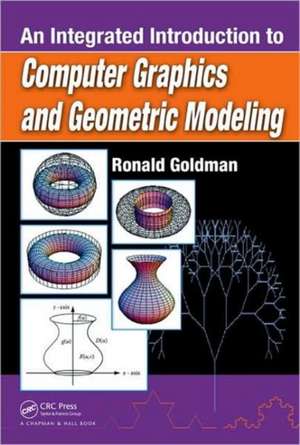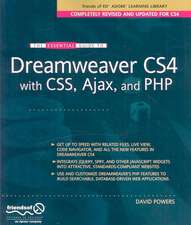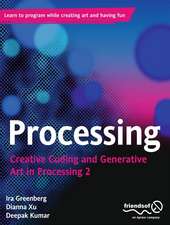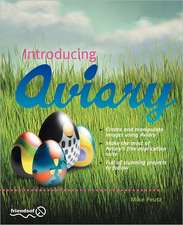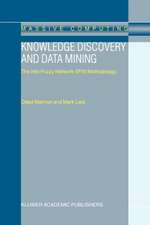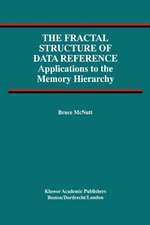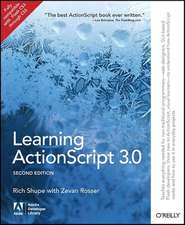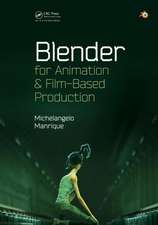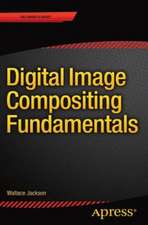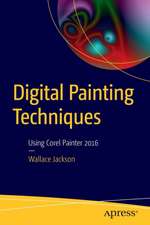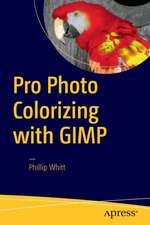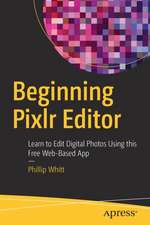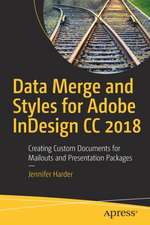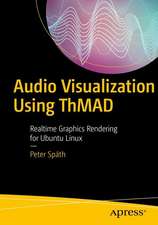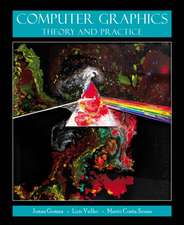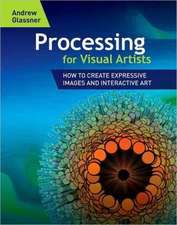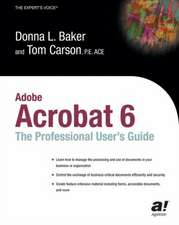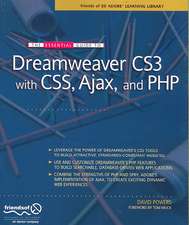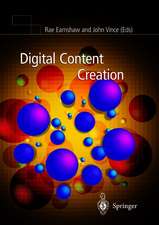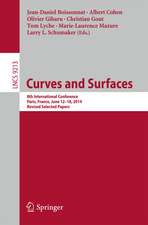An Integrated Introduction to Computer Graphics and Geometric Modeling: Chapman & Hall/CRC Computer Graphics, Geometric Modeling, and Animation Series
Autor Ronald Goldmanen Limba Engleză Hardback – 14 iul 2009
Supplying the mathematical foundations, the book covers linear algebra topics, such as vector geometry and algebra, affine and projective spaces, affine maps, projective transformations, matrices, and quaternions. The main graphics areas explored include reflection and refraction, recursive ray tracing, radiosity, illumination models, polygon shading, and hidden surface procedures. The book also discusses geometric modeling, including planes, polygons, spheres, quadrics, algebraic and parametric curves and surfaces, constructive solid geometry, boundary files, octrees, interpolation, approximation, Bezier and B-spline methods, fractal algorithms, and subdivision techniques.
Making the material accessible and relevant for years to come, the text avoids descriptions of current graphics hardware and special programming languages. Instead, it presents graphics algorithms based on well-established physical models of light and cogent mathematical methods.
| Toate formatele și edițiile | Preț | Express |
|---|---|---|
| Paperback (1) | 447.30 lei 6-8 săpt. | |
| CRC Press – 15 oct 2019 | 447.30 lei 6-8 săpt. | |
| Hardback (1) | 845.62 lei 6-8 săpt. | |
| CRC Press – 14 iul 2009 | 845.62 lei 6-8 săpt. |
Preț: 845.62 lei
Preț vechi: 1057.02 lei
-20% Nou
Puncte Express: 1268
Preț estimativ în valută:
161.83€ • 175.72$ • 135.94£
161.83€ • 175.72$ • 135.94£
Carte tipărită la comandă
Livrare economică 22 aprilie-06 mai
Preluare comenzi: 021 569.72.76
Specificații
ISBN-13: 9781439803349
ISBN-10: 143980334X
Pagini: 590
Ilustrații: 399 black & white illustrations, 47 colour illustrations, 16 black & white tables
Dimensiuni: 178 x 254 x 33 mm
Greutate: 1.22 kg
Ediția:1
Editura: CRC Press
Colecția CRC Press
Seria Chapman & Hall/CRC Computer Graphics, Geometric Modeling, and Animation Series
ISBN-10: 143980334X
Pagini: 590
Ilustrații: 399 black & white illustrations, 47 colour illustrations, 16 black & white tables
Dimensiuni: 178 x 254 x 33 mm
Greutate: 1.22 kg
Ediția:1
Editura: CRC Press
Colecția CRC Press
Seria Chapman & Hall/CRC Computer Graphics, Geometric Modeling, and Animation Series
Public țintă
Upper undergraduate/graduate students in introductory computer graphics/geometric modeling courses.Cuprins
Two-Dimensional Computer Graphics: From Common Curves to Intricate Fractals. Mathematical Methods for Three-Dimensional Computer Graphics. Three-Dimensional Computer Graphics: Realistic Rendering. Geometric Modeling: Freedom Curves and Surfaces. Further Readings. Index.
Notă biografică
Ron Goldman is a professor of computer science at Rice University, Houston, Texas. Dr. Goldman’s current research interests encompass the mathematical representation, manipulation, and analysis of shape using computers.
Recenzii
… this book may be the first book on geometric modelling that also covers computer graphics. In addition, it may be the first book on computer graphics that integrates a thorough introduction to ‘freedom’ curves and surfaces and to the mathematical foundations for computer graphics. … the book is well suited for an undergraduate course. … The entire book is very well presented and obviously written by a distinguished and creative researcher and educator. It certainly is a textbook I would recommend. …
—Computer-Aided Design, 42, 2010
… Many books concentrate on computer programming and soon become obsolete because of newly emerging developments in software languages and hardware. Thankfully, this text is different! The text is void of programming examples as these would have quickly rendered the book outdated, given the transitory nature of graphics languages. … The author has used his experiences of teaching and research to write a book that will, I am sure, become a valuable reference source for years to come. Each chapter has a number of exercises for further study and many chapters have programming projects which will require further work and implementation in a graphics language.
—International Statistical Review, 2010
Dr. Goldman has dedicated the past 20 years of his career to teaching and research as a professor of computer science at the University of Waterloo and Rice University. The pedagogical style of this book has been refined during his many years of teaching this material. He is an excellent mentor of students and I am pleased that his reach will be extended through the publication of this book.
—Thomas W. Sederberg, Brigham Young University
—Computer-Aided Design, 42, 2010
… Many books concentrate on computer programming and soon become obsolete because of newly emerging developments in software languages and hardware. Thankfully, this text is different! The text is void of programming examples as these would have quickly rendered the book outdated, given the transitory nature of graphics languages. … The author has used his experiences of teaching and research to write a book that will, I am sure, become a valuable reference source for years to come. Each chapter has a number of exercises for further study and many chapters have programming projects which will require further work and implementation in a graphics language.
—International Statistical Review, 2010
Dr. Goldman has dedicated the past 20 years of his career to teaching and research as a professor of computer science at the University of Waterloo and Rice University. The pedagogical style of this book has been refined during his many years of teaching this material. He is an excellent mentor of students and I am pleased that his reach will be extended through the publication of this book.
—Thomas W. Sederberg, Brigham Young University
Descriere
Taking a novel, more appealing approach than current texts, this book presents an easy-to-read introduction to computer graphics and geometric modeling. Emphasizing high-level algorithms, it focuses on standard graphics, modeling, and mathematical methods, including ray tracing, polygon shading, radiosity, fractals, freeform curves and surfaces, vector methods, and transformation techniques. The author begins with fractals first rather than typical line drawing algorithms and also brings back the turtle from obscurity to introduce several major concepts in computer graphics. The text includes many exercises and programming projects and offers a website with PowerPoint slides.
